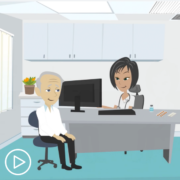Thrive | What You Should Know About MPN Symptoms & Treatment Side Effects
Thrive | What You Should Know About MPN Symptoms & Treatment Side Effects from Patient Empowerment Network on Vimeo.
How are MPN symptoms and treatment side effect managed? In this animated explainer video, an MPN specialist and myelofibrosis patient discuss the importance of clear communication with your healthcare team, the process for assessing common issues, and advice for advocating for yourself.
Related Programs:

|

|

How Molecular Markers Affect MPN Treatment | Advances in Research |
Transcript:
Brian:
Hi, I’m Brian. Nice to meet you! I’ve been living with a condition called myelofibrosis for many years. While there have certainly been ups and downs, I’ve been able to navigate care for my condition and to live a full life.
So how have I been able to do that? First and foremost, I have a great relationship with my care team, whom I communicate with regularly. Meet, Dr. Liu – my doctor.
Dr. Liu:
Hi! I’m Dr. Liu, and I’m a hematologist and a specialist in myeloproliferative neoplasms or MPNs. The three types of MPNs are essential thrombocythemia, or ET, polycythemia vera or PV, and myelofibrosis, or MF. This group of blood cancers is characterized by the bone marrow overproducing a certain type of cell.
Maintaining a good relationship with your healthcare team, coupled with finding a treatment approach that works for you, can help you live a full life and to thrive with an MPN.
Brian:
Exactly, Dr. Liu. Over the years, I’ve experienced periodic issues with my condition. I’ve had symptoms and treatment side effects that have been bothersome and interfered with my life. But, communication with my team has been essential to feeling well.
Dr. Liu:
That’s right, Brian. When symptoms or treatment side effects are bothering you, it’s important to let your healthcare provide know how you are feeling.
Brian:
For example, recently I felt tired beyond general sleepiness. And when I shared this with Dr. Liu, we discussed potential causes of the fatigue, and we talked in-depth about my options to manage it, including changing therapy and some simple changes to my diet and lifestyle.1 Over time, my energy levels improved, but having the open dialogue with Dr. Liu was essential to tackling this symptom head-on.
Dr. Liu:
That’s a great example. When I first hear from a patient that they are having an issue, we go through several steps to find a solution.2
We start by ensuring that the disease is well-controlled, so we check blood counts. Next, we try to determine if it is a symptom of the MPN or a side effect of the treatment. Once we’ve done those steps, we come up with potential solutions which may include, but are not limited to:
- A dose reduction or a treatment holiday.
- Changing therapy to find something that is more well-tolerated.
Other considerations are dependent upon the specific symptoms and side effects but may include:
- Supportive care options, including diet and exercise.
- A visit to your primary care doctor to see if there is something else going on physically.
Brian:
That’s good to know, Dr. Liu. Something you brought up with me, which I feel is important to mention, is mental health. Often, emotional symptoms can take a toll on the body, causing fatigue or other issues.
Dr. Liu:
Great point, Brian. Seeking care for your mental health is crucial, particularly if you are in active treatment.
Brian:
Of course, we know that the symptoms and treatment side effects for MPNs can vary widely, so what advice do you have for patients who may be afraid to speak up?
Dr. Liu:
The most important thing to remember is that we have options to help you, no matter what you are going through. It’s your body and if you don’t let your provider know what you’re going through, they can’t help you.
Brian:
So true. It’s also a good idea to bring a care partner along to appointments, sometimes a spouse or friend can you help you communicate what’s going on.
Dr. Liu:
That’s great advice, Brian. Bringing someone along to take notes is a great idea. Also, be sure to write down any questions or concerns you have in advance to make the most of your appointment.
Brian:
OK, Dr. Liu, let’s recap your advice for MPN symptom management:
Dr. Liu:
Good idea! First, remember that everyone’s MPN is different, so managing symptoms and side effects can be tricky. Communicating with your healthcare team is critical to your overall care – report any and all concerns to your team immediately.
And, do your part. Make sure you see your primary care physician regularly and do your best to maintain a healthy lifestyle.
Brian
And, most importantly, remember you are at the center of your care. Never hesitate to share your opinion and to advocate for yourself.
To learn more, visit powerfulpatients.org/MPN to access a library of tools. Thanks for joining us!










